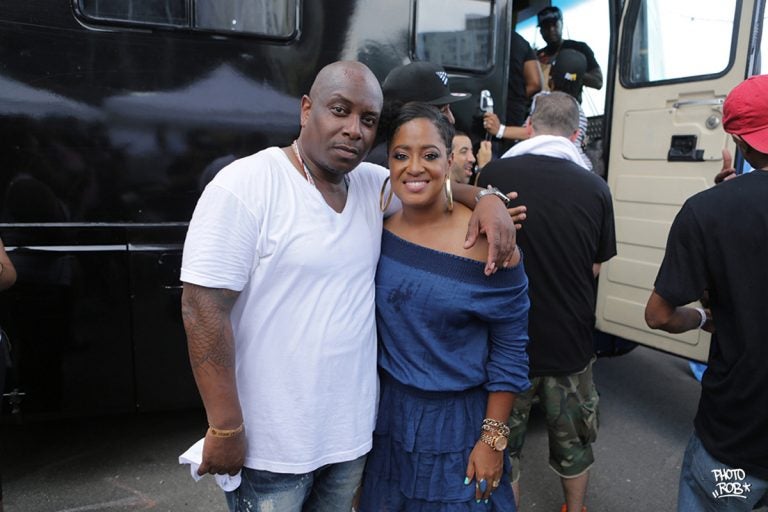An ode to Combat Jack and his preservation of hip hop culture

Hip hop pioneer Combat Jack poses for a photo with Grammy-nominated emcee Rapsody after her performance at the 12th Annual Brooklyn Hip Hop Festival in 2016. (Robert Adam Mayer)
Hip hop runs through my veins, and I am a shameless podcast nerd, so my heart was broken when I heard about the recent passing of Reggie Ossé, a.k.a. Combat Jack, founder of “The Combat Jack Show” podcast, a living archive of hip hop history. He died in Brooklyn on Dec. 20, just two months after announcing he had been diagnosed with cancer.
His work introduced me to the depth and possibilities not only in hip hop but also myself. To use his words, every episode was a reminder to “dream those dreams, then man up, because a life without dreams is black and white, and the universe flows in technicolor and surround sound! Blaow!”
About four years ago, as I settled into my thirties, I reached a point where I felt disconnected from the culture that had been such an integral part of my life; hip hop started to look foreign to me. Whether it was music, fashion, or current events, a majority of contemporary hip hop was unbearable. I wanted content that met me where I was, that reflected the maturity of hip hop, while still being fresh.
During this time I listened to a lot of podcasts for entertainment and eventually I gave “The Combat Jack Show” a listen. I heard the name on other podcasts and saw it in social media profiles from people I knew in Brooklyn, where the show was founded. I even knew some of the co-hosts and producers of the show, and I used to frequent parties at their studio. I am actually embarrassed that it took me so long to get familiar with the show, but I am forever thankful that I did.
Through a simple interview format, “The Combat Jack Show” gave a platform to the legends of the past. He interviewed artists like DJ Kool Herc, who is credited as the father of hip hop, and
DJ Marley Marl, who pioneered sampling, taking pieces of music from records and looping them over drum patterns to make a new composition.
He also highlighted the importance of the New York nightclub scene of the late ’80s and ’90s, interviewing party promoters such as Jessica Rosenblum and Peter Shue, whose parties included a who’s who of celebrities, where future moguls mingled and networked to form relationships that would lead to historic accomplishments.
With this new knowledge, I was reminded of how hip hop changes in cycles and trends through parties, fashion, music, and business. The connection from the past to the present was clear to me, and I began to appreciate more of what the new generation had to offer.
Soon other podcasts would follow. Shows such as “Rap Radar” and “Drink Champs” would become popular, following the path of Combat Jack by revisiting the past and challenging the notion that hip hop is a young person’s game, redefining what it means to be relevant.
In addition to being the creator of one of the most important podcasts, Combat also co-founded an equally pivotal podcast production company, Loud Speakers Network.
With “The Combat Jack Show” starting off the roster, their list of podcasts include successful shows that are mainstays among the top podcasts on iTunes. Loud Speakers is one of the top networks on SoundCloud.
The production company brings in over one million listeners per month with shows like “The Read,” a no-punches-pulled critique on society and pop culture from the perspective of two black queer hosts, Kid Fury and Crissle; “The Friend Zone,” a show about mental health and well-being; and the successful podcast series “Mogul: The Life and Death of Chris Lighty,” which tells the story of the music executive behind some of hip hop’s biggest acts.
With these and other programs, Combat and LSN co-founder Chris Murrow brought new stories and perspectives to an audience desperately searching for them, especially those relating to black culture.
Mark Randall, who founded Philadelphia podcast company Spaces Productions in 2016, said Loud Speakers Network is “the foundation for podcasts of color today” that “[speaks] to urban youth.”
Podcasting is an intimate artform. Transparency is crucial for most, so they sound less like structured programs and more like private conversations that we’re invited to listen in on. And with a low barrier of entry, they allow for more groups and cultures to control their own narratives.
As hip hop becomes more diverse and continues to age, the story of how it began and grew is bound to become distorted by people looking to rewrite history for their own benefit. Right now the influx of white rappers, for example, some of whom seem to distance themselves from blackness (or what they perceive it to be) leads many to suspect that hip hop will go the way of rock ‘n’ roll.
Marginalized black musicians created the genre in the mid-twentieth century, but over time it was appropriated by white musicians who had the full power of the music industry behind them.
This is why Combat Jack is a pioneer. Because through the platform of podcasting, simply by reaching back and mining the overlooked stories of hip hop and black culture, he collected our history to make sure we don’t repeat it.
He is a jewel to the culture, and it is only right that before he left us he was shouted out in the greatest freestyle of all time by none other than Philly’s own Black Thought.
Combat Jack will be missed, but his legacy will live on. Rest In Power.
—
Darryl C. Murphy is a journalist based in Philadelphia, currently focusing on local education.
WHYY is your source for fact-based, in-depth journalism and information. As a nonprofit organization, we rely on financial support from readers like you. Please give today.




